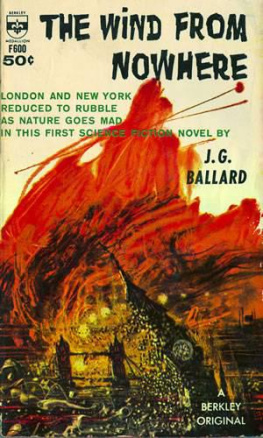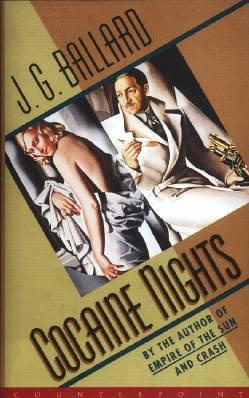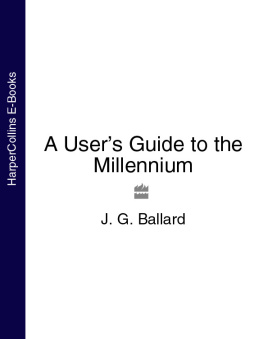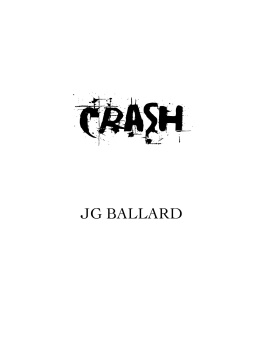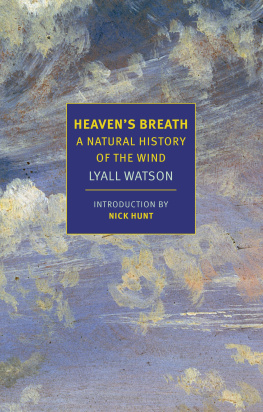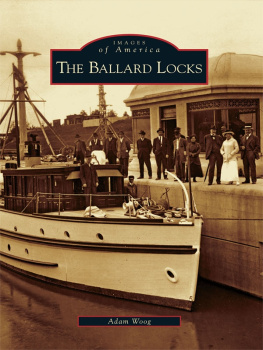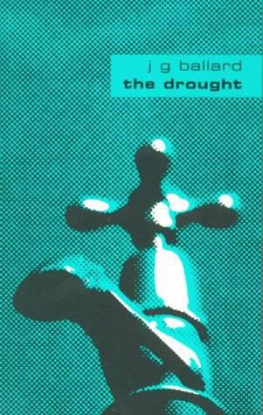Annotation
The Wind From Nowhere (1961) is JG Ballard's first novel, not that you'd know it from official JGB bibliographies, where it's never mentioned, or in interviews, where Ballard continues to assert that The Drowned World was his first book.
The wind from nowhere has gone back to nowhere.
In a 1975 interview with David Pringle, Ballard says: "I don't see my fiction as being disaster-oriented, certainly not most of my SF - apart from The Wind from Nowhere which is just a piece of hackwork. The others, which are reasonably serious, are not disaster stories."
The book does contain some 'empty symbolism', and the characters sometimes articulate overlong expositions, all a bit jarring from an author who was to bloom into the master of sparse, laser-sharp, all-killer-no-filler writing.
Still, it *is* Ballard; all the classic archetypes are in place, if a little sketchily (except for the 'Vaughan' figure) - the bitch-as-catalyst, especially - and it does have what must be the first truly classic JGB quote, one that ranks with the pearls collected in Vale's RE/Search book, a quote that both presages future events and qualifies current ones.
A JGB 'soundbite' as Mr Pringle calls them... On p112 of my Penguin edition, Ballard writes: "Remember, it's not enough to make history - you've got to arrange for someone to record it for you."
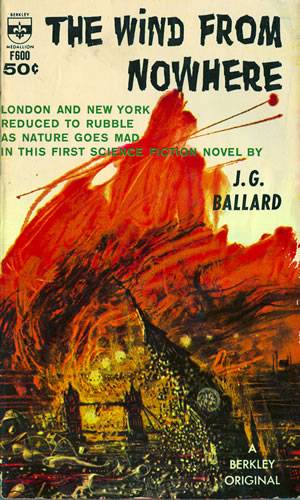
J.G. Ballard
The Wind From Nowhere
1 The Coming of the Dust
The dust came first.
Donald Maitland noticed it as he rode back in the taxi from London Airport, after waiting a fruitless 48 hours for his PanAmerican flight to Montreal. For three days not a single aircraft bad got off the ground. Weather conditions were freak and persistent-ten-tenths cloud and a ceiling of 700 feet, coupled with unusual surface turbulence, savage crosswinds of almost hurricane force that whipped across the runways and had already groundlooped two 707's on their take-off runs. The great passenger terminus building and the clutter of steel huts behind it were clogged with thousands of prospective passengers, slumped on their baggage in long straggling queues, trying to make sense of the continuous crossfire of announcements and counter-announcements.
Something about the build-up of confusion at the airport warned Maitland that it might be another two or three days before he actually took his seat in an aircraft. He was well back in a queue of about 300 people, and many of these were husbands standing in for their wives as well. Finally, fed up and longing for a bath and a soft bed, he had picked up his two suitcases, shouldered his way-through the melee of passengers and airport police to the car foyer, and climbed into a taxi.
The ride back to London depressed him. It took half an hour to get out of the airport, and then the Great West Road was a chain of jams. His departure from England, long pondered and planned, culmination of endless heart-searching (not to speak of the professional difficulties involved in switching his research fellowship at the Middlesex to the State Hospital at Vancouver) had come to a dismal anticlimax, all the more irritating as he had given in to the rather adolescent whim of walking out without telling Susan.
Not that she would have been particularly upset. At the beach house down at Worthing where she was spending the summer, the news would probably have been nothing more than an excuse for another party or another sports coupe, whichever seemed the most interesting. Still, Maitland _had_ hoped that the final quiet letter of resignation with its Vancouver postmark might have prompted at least a momentary feeling of pique, a few seconds of annoyance, on Susan's part. He had hoped that even the most obtuse of her boy friends would detect it, and it would make them realize that he was something more than her private joke figure.
Now, however, the pleasure of such a letter would have to be deferred. Anyway, Maitland reflected, it was only a small part of the great feeling of release he had experienced since his final decision to leave England. As the taxi edged through the Hounslow traffic, he looked out at the drab shopfronts and grimy areaways, the congested skyline against the dark low cloud like a silhouette of hell. It was only 4 o'clock but already dusk was coming in, and most of the cars had their lights on. The people on the pavements had turned up their collars against the hard gritty wind which made the late June day seem more like early autumn.
Chin in one hand, Maitland leaned against the window, reading the flapping headlines on the newspaper stands.
QUEEN MARY AGROUND NEAR CHERBOURG
High Winds Hamper Rescue Launches
A good number of would-be passengers who should have picked up the liner at Southampton had been at the airport, Maitland remembered, but she had been over a week late on her live-day crossing of the Atlantic, having met tremendous seas headwinds like a wall of steel. If they were actually trying to take off passengers, it looked as if the great ship was in serious trouble.
The taxi window was slightly open at the top. In the angle between the pillar and the ledge Maitland noticed that a pile of fine brown dust had collected, almost a quarter of an inch thick at its deepest point. Idly, he picked up a few grains and rubbed them between his fingers. Unlike the usual gray detritus of metropolitan London, the grains were sharp and crystalline, with a distinctive red-brown coloring.
They reached Notting Hill, where the traffic stream slowed to move around a gang of workmen dismembering a large elm that had come down in the wind. The dust lay thickly against the curb stones, silting into the crevices in the low walls in front of the houses, so that the street resembled the sandy bed of some dried-up mountain torrent.
At Lancaster Gate they turned into Hyde Park and drove siowly through the windswept trees toward Knightsbridge. As they crossed the Serpentine he noticed that breakwaters had been erected at the far end of the lake; white-topped waves a foot high broke against the wooden palisades, throwing up the wreckage of one or two smashed rowing boats torn from the boathouse moorings on the northside.
Maitland slid back the partition between himself and the driver when they passed through the Duke of Edinburgh Gate. The wind rammed into his face, forcing him to shout.
" 29 Lowndes Square! Looks as if you've been having some pretty rough weather here."
"Rough, I'll say!" the driver yelled back. "Just heard ITV's gone off the air. Crystal Palace tower came down this morning. Supposed to be good for two hundred miles an hour."
Frowning sympathetically, Maitland paid him off when they stopped, and hurried across the deserted pavement into the foyer of the apartment block.
The apartment had been Susan's before their marriage seven years earlier, and she still paid the rent, finding it useful as a pied a terre whenever she came up to London on a surprise visit. To Maitland it was a godsend; his fellowship would have provided him with little more than a cheap hotel room. (Research on petroleum distillates or a new insecticide would have brought him, at 35, a senior executive's salary, but research into virus genetics-the basic mechanisms of life itself-apparently merited little more than an undergraduate grant.) Sometimes, indeed, he counted himself lucky that he was married to a rich neurotic-in a way, he had the best of both worlds. Indirectly she and her circle of pleasure seekers made a bigger contribution to the advancement of pure science than they realized.


